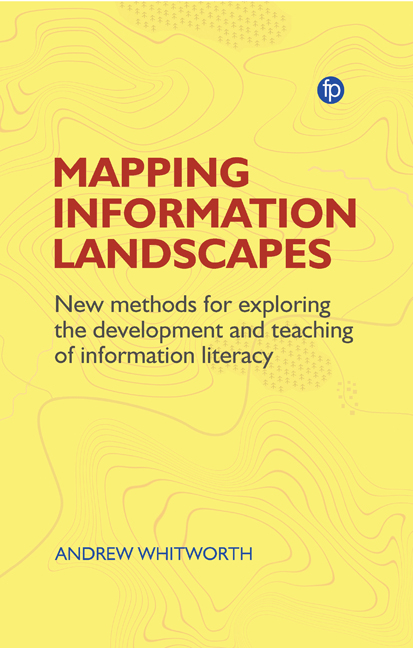 Mapping Information Landscapes
Mapping Information Landscapes Book contents
1 - Information Literacy and Information Practice
Published online by Cambridge University Press: 23 July 2020
Summary
Introduction
A full history of IL remains to be written. A commonly-stated position – so frequently presented that it has become a fundamental trope of the field – is that the concept was created in a 1974 report by Paul Zurkowski, presented to the US National Commission on Libraries and Information Science and entitled The Information Service Environment: Relationships and Priorities. In Kelly's eulogy to this work and its author, he writes (2014, 1): ‘The power of Information Literacy was unleashed in 1974 when Paul G. Zurkowski, Esq., founded the IL movement at the dawn of the Information Age.’ The statement is, at best, an exaggeration. Yet, many other writers (Rader, 2002; Eisenberg, Lowe and Spitzer, 2004; Markless and Streatfield, 2007) consider Zurkowski (1974) as such a seminal piece that their histories pay no attention to relevant work that comes before it.
Computerisation may have brought about significant changes to how we work with and learn about information landscapes, but the value of information per se has been recognised for millennia. Socrates recognised ‘that knowledge ought to be applied to conduct in the same way as it was already applied with such success to carpentry, shoemaking or medicine’ (Lindsay, 1906, xii). Plato would ‘persuade those who are to share in the highest affairs of the city to take to calculation, and embrace it in no amateur spirit… until they arrive by the help of sheer intelligence at a vision of the nature of numbers’ (Lindsay, 1906, 219). In other words, he affirms the importance of information, an ability to handle it effectively and an objective, dispassionate viewpoint, when it comes to taking effective decisions and planning (military) strategy.
Information, and by extension those trained in its effective use and application, has always been valuable to power holders. The history of espionage, propaganda and surveillance acknowledges this, whether in wartime and/or in asserting political strength at home. Control over information gathering and dispersal is a key element in how consent to dominant political orders is secured less through overt force and more through the manufacturing of consent, or what Gramsci (1971) called hegemony. Hegemonic processes include control over culture, education and the media. Dahl (1961) included ‘control over information’ in his analysis of key political resources.
- Type
- Chapter
- Information
- Mapping Information LandscapesNew Methods for Exploring the Development and Teaching of Information Literacy, pp. 1 - 22Publisher: FacetPrint publication year: 2020


